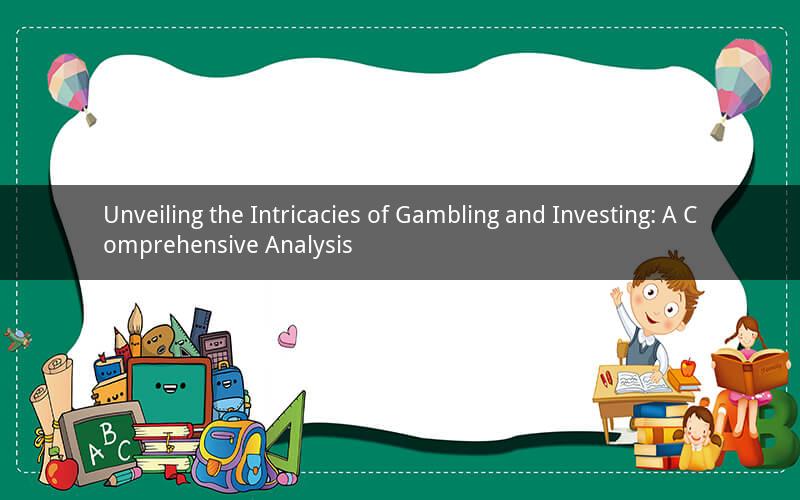
Gambling and investing are two distinct concepts that often spark debate and curiosity among individuals. While both involve taking risks and the potential for financial gain, they differ significantly in terms of purpose, methodology, and consequences. This article aims to delve into the intricacies of gambling and investing, exploring their similarities and differences, and providing valuable insights into each practice.
The Divergent Purposes of Gambling and Investing
Gambling, at its core, is driven by the desire for immediate gratification and the thrill of uncertainty. It involves placing bets on uncertain outcomes, with the hope of winning money. The primary motivation behind gambling is entertainment and the chance to experience a rush of adrenaline. On the other hand, investing is a long-term endeavor aimed at achieving financial goals, such as saving for retirement, generating income, or building wealth. The purpose of investing is to grow wealth over time through careful analysis and strategic decision-making.
The Methods and Strategies of Gambling and Investing
Gambling typically involves placing bets on random events, such as flipping a coin, rolling dice, or playing card games. The outcomes are uncertain, and the chances of winning are predetermined by the odds. In contrast, investing requires thorough research and analysis to identify potential opportunities. Investors analyze financial statements, market trends, and other relevant factors to make informed decisions. Strategies employed in investing include diversification, asset allocation, and risk management.
The Potential Consequences of Gambling and Investing
Gambling carries the risk of losing money, as the outcomes are often unpredictable. While there is a chance of winning, the odds are typically stacked against the gambler. The potential consequences of gambling can range from financial loss to addiction and personal problems. Investing, on the other hand, carries a lower risk of losing all of one's money, as investments are usually diversified across various asset classes. However, investing does involve risks, such as market volatility and the possibility of loss. The potential consequences of investing include financial gain, as well as the potential for loss.
The Role of Luck in Gambling and Investing
Luck plays a significant role in both gambling and investing. In gambling, luck is the primary factor that determines the outcome of the bet. While skill and strategy can influence the chances of winning, luck ultimately dictates the result. In investing, luck also plays a role, as market conditions and unexpected events can impact the performance of investments. However, luck is not the sole determinant of success in investing. Skill, knowledge, and discipline are crucial factors that can help mitigate the impact of luck and improve the likelihood of achieving long-term financial goals.
The Psychological Aspect of Gambling and Investing
The psychological aspect of gambling and investing cannot be overlooked. Both practices can evoke strong emotions, such as excitement, fear, and greed. In gambling, the thrill of winning and the anticipation of a big payout can lead to impulsive behavior and the disregard for rational decision-making. Investing, on the other hand, requires discipline, patience, and a long-term perspective. The psychological aspect of investing involves managing emotions and making rational decisions based on sound analysis.
5 Questions and Answers
1. Question: Can gambling be considered a form of investing?
Answer: No, gambling and investing are distinct practices with different purposes and methodologies. While both involve taking risks, gambling is primarily driven by entertainment, while investing is aimed at achieving financial goals.
2. Question: Are there any similarities between gambling and investing?
Answer: Yes, both gambling and investing involve taking risks and the potential for financial gain. Additionally, both practices require some level of skill, knowledge, and discipline.
3. Question: Can investing be considered a safer alternative to gambling?
Answer: Investing can be considered a safer alternative to gambling, as it involves diversification and long-term strategies aimed at mitigating risk. However, investing still carries risks, and it is essential to conduct thorough research and analysis before making investment decisions.
4. Question: Can gambling lead to financial independence?
Answer: While it is possible to win significant amounts of money through gambling, relying on gambling as a means of achieving financial independence is highly risky and not recommended. Financial independence is typically achieved through disciplined investing and sound financial planning.
5. Question: Is it possible to combine gambling and investing?
Answer: It is possible to combine gambling and investing, but this can be risky and may lead to poor financial outcomes. Individuals should approach both practices with caution and prioritize disciplined investing to achieve long-term financial goals.
In conclusion, gambling and investing are two distinct practices with unique purposes, methodologies, and consequences. While both involve taking risks and the potential for financial gain, they differ significantly in terms of the underlying motivations and outcomes. Understanding the intricacies of both practices can help individuals make informed decisions and prioritize disciplined investing as a means of achieving long-term financial success.